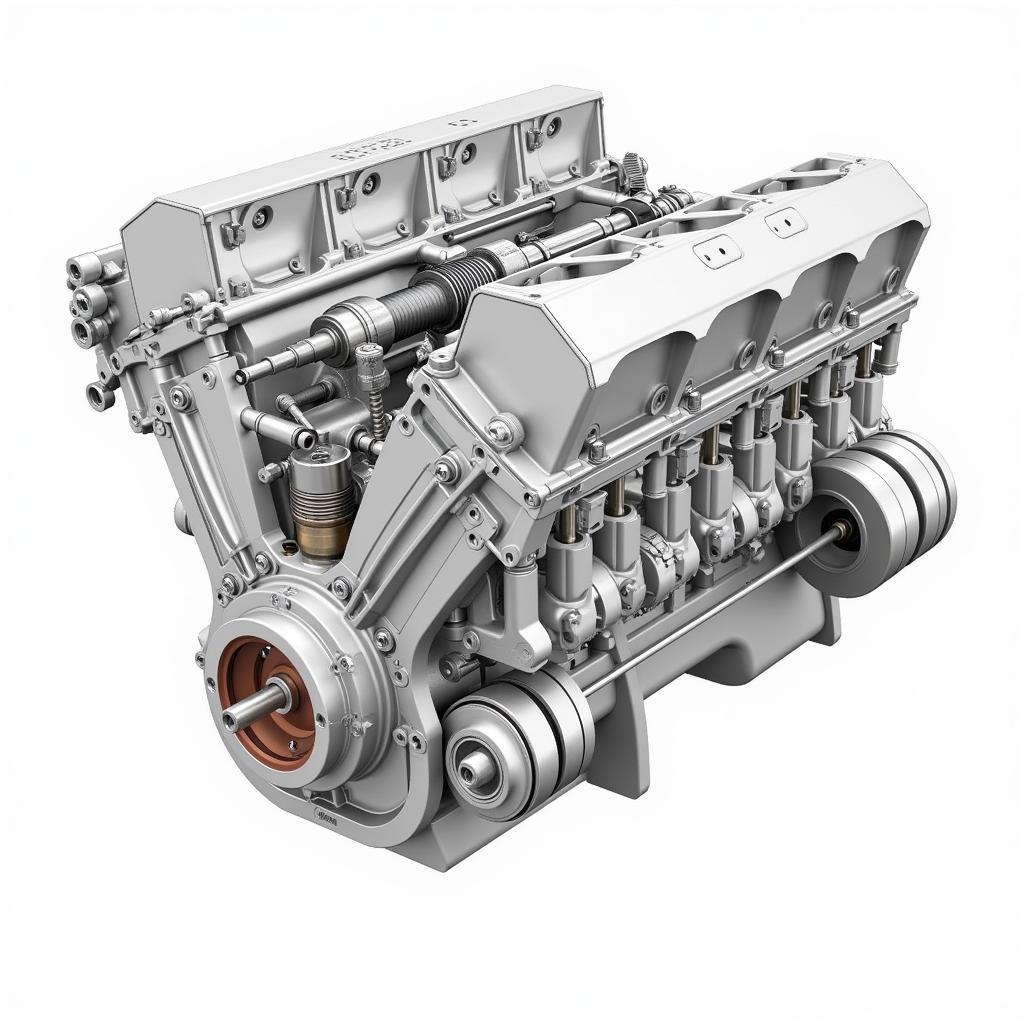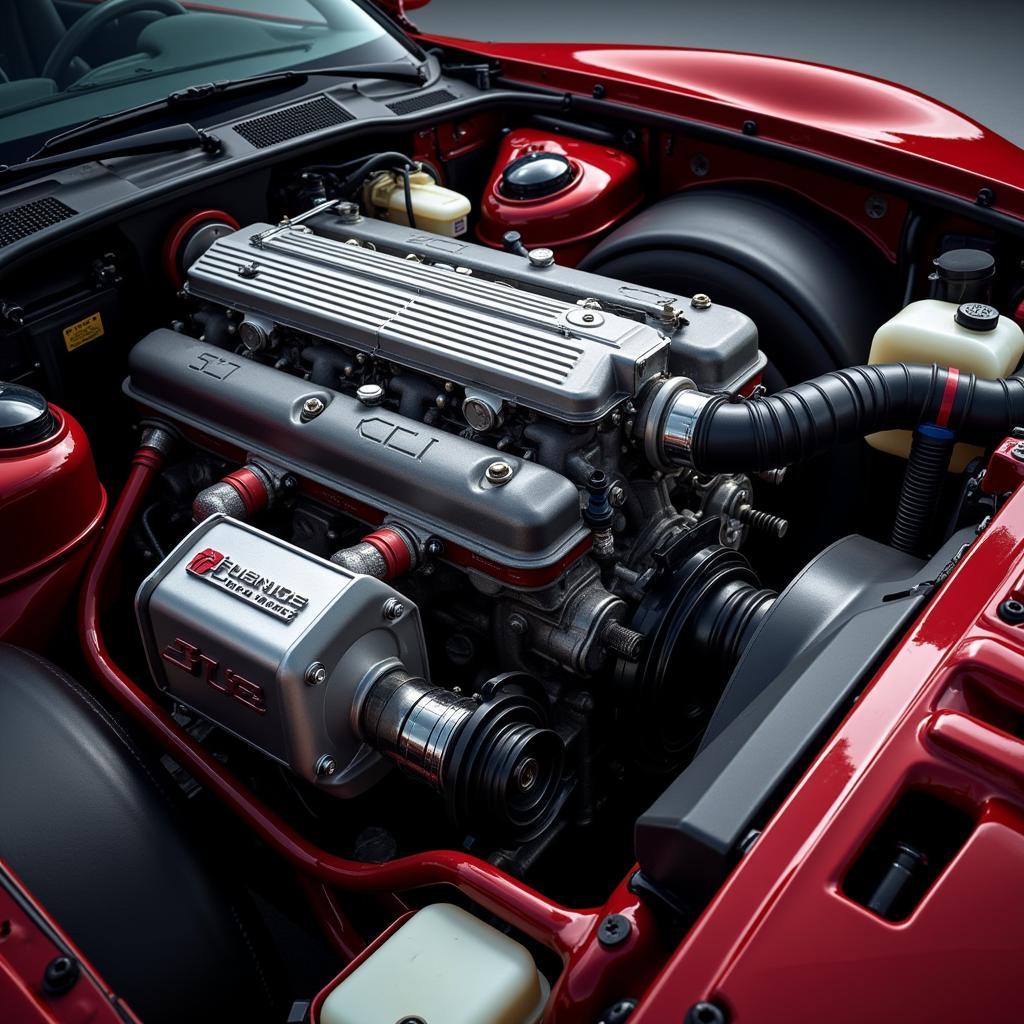V8 engine cars have captivated automotive enthusiasts for decades, representing the pinnacle of power and performance. From the rumble of American muscle cars to the refined roar of European sports cars, the V8 engine remains an icon of automotive engineering. This article explores the fascinating world of V8 engine cars, examining their history, mechanics, performance advantages, and the evolving landscape they occupy in the modern automotive industry.
The V8 engine configuration, with its two banks of four cylinders arranged in a V-shape, offers a unique blend of power, smoothness, and a characteristic exhaust note that is instantly recognizable. But what makes these engines so special, and why do they continue to hold a prominent place in the hearts of car lovers? Let’s delve deeper.
The History and Evolution of V8 Engines
The history of the V8 engine is rich and fascinating. Early examples date back to the early 20th century, initially used in aircraft and boats. The adoption of the V8 in automobiles marked a turning point in performance and quickly became synonymous with power and prestige. From early American muscle cars like the Ford Mustang and Chevrolet Corvette to luxurious European grand tourers, the V8 became a symbol of automotive excellence. Over time, advancements in technology have led to more efficient and powerful V8s, incorporating features like fuel injection, variable valve timing, and even forced induction.
After this initial success, manufacturers sought to improve upon the V8’s inherently balanced design. One such step was developing overhead camshaft (OHC) configurations which further refined engine power and efficiency. For enthusiasts seeking open-air thrills, check out some of the best convertible cars currently on the market.
Understanding the Mechanics of a V8 Engine
The core of the V8 engine’s performance lies in its unique configuration. The V-shaped arrangement of the cylinders allows for a compact design while maintaining a larger displacement compared to inline engines. This larger displacement translates to increased power and torque, allowing V8 engine cars to accelerate rapidly and effortlessly cruise at high speeds. The firing order of the cylinders is carefully orchestrated to minimize vibrations and deliver a smooth power delivery. Each component, from the crankshaft to the camshaft, plays a crucial role in the engine’s symphony of controlled explosions.
 V8 Engine Components Diagram
V8 Engine Components Diagram
The Advantages of V8 Engine Cars
Why choose a V8? The answer often lies in the exhilarating performance they offer. The inherent balance of the V8 design allows for higher RPMs and a wider power band, resulting in impressive acceleration and a thrilling driving experience. The signature rumble of a V8 exhaust is another appealing aspect, adding to the emotional connection drivers feel with these powerful machines. Moreover, V8 engines are often known for their reliability and durability, especially when properly maintained.
Thinking of exploring other performance options? Check out the McLaren cars for a taste of supercar engineering.
V8 Engines in the Modern Era: Adapting to Change
The automotive landscape is undergoing a significant transformation, with a growing focus on fuel efficiency and environmental consciousness. While the traditional, naturally aspirated V8 might seem at odds with this trend, manufacturers are continuously innovating to adapt these iconic engines to the demands of the modern world. Technologies like cylinder deactivation, hybrid systems, and even electric supercharging are being incorporated into V8 designs to improve fuel economy and reduce emissions without sacrificing performance. The future of the V8 may look different, but its legacy of power and performance is likely to endure.
The Allure of the V8: More Than Just an Engine
For many, V8 engine cars represent more than just a mode of transportation; they symbolize a passion for automotive engineering and a connection to a rich history of performance and innovation. The unique sound, the raw power, and the feeling of control behind the wheel of a V8-powered machine create an unforgettable driving experience. Whether it’s the classic American muscle car or the sophisticated European sports car, the V8 engine continues to hold a special place in the automotive world.
Considering a classic with modern amenities? Take a look at the Genesis cars, blending luxury with performance.
Conclusion: The Enduring Legacy of the V8
V8 engine cars represent a timeless blend of power, performance, and automotive artistry. From their historic roots to their ongoing evolution in the modern era, V8s continue to capture the imagination of drivers and enthusiasts worldwide. While the future of automotive technology is constantly evolving, the allure and legacy of the V8 engine are sure to endure for generations to come. Interested in the classics? Check out some iconic 40s cars.
FAQ
-
What does V8 stand for? V8 refers to the engine’s configuration: a V-shaped arrangement of eight cylinders.
-
Why are V8 engines so powerful? Their larger displacement allows for greater combustion and thus more power.
-
Are V8 engines fuel-efficient? Traditionally not, but modern technologies are improving their fuel economy.
-
What are some examples of V8 engine cars? Ford Mustang, Chevrolet Corvette, Dodge Challenger, many luxury and sports cars.
-
What is the future of V8 engines? They are adapting through hybrid technology and other innovations.
-
What makes a V8 engine sound unique? The firing order and exhaust system create the distinct rumble.
-
Are V8 engines expensive to maintain? Generally, they can be slightly more expensive than smaller engines.
Looking for American sports car heritage? Explore the cars Corvette Stingray for a true icon.
 V8 Engine in a Sports Car
V8 Engine in a Sports Car
Common V8 Engine Issues
- Misfires: Caused by faulty spark plugs, ignition coils, or fuel injectors.
- Overheating: Often due to a failing thermostat, water pump, or radiator leak.
- Oil Leaks: Can originate from worn gaskets, seals, or cracked engine components.
- Knocking Sounds: May indicate low oil pressure or internal engine damage.
Further Reading
Explore our articles on specific V8-powered vehicles and engine technologies for deeper insights.
Contact Us
For assistance, contact us via WhatsApp: +1(641)206-8880, Email: [email protected], or visit our office at 276 Reock St, City of Orange, NJ 07050, United States. We have a 24/7 customer support team.


